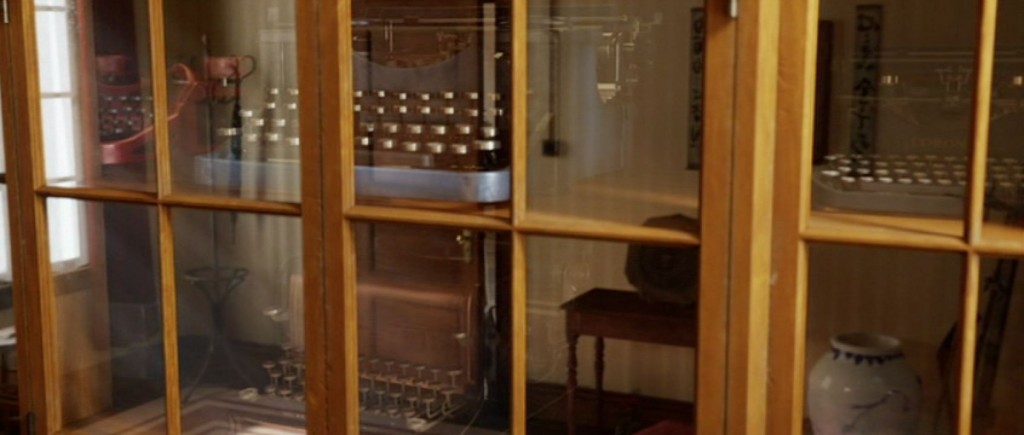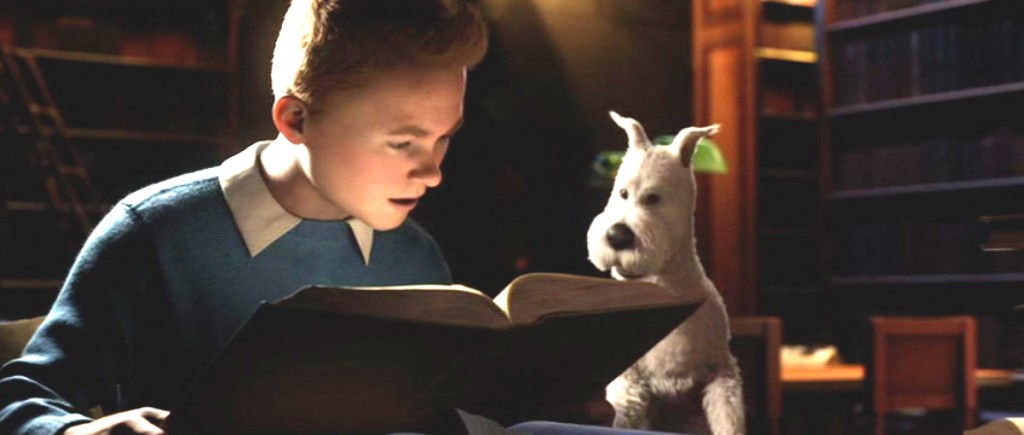Spielberg: The Adventures of Tintin part 2
Tintin is a writer. Spielberg wants us to remember that — the first thing he shows us in Tintin’s apartment is his typewriter collection. That seems like a really odd choice; Spielberg doesn’t show Tintin’s collection of rare artifacts or model vehicles, Tintin’s main obsession is writing instruments. And we are reminded that Tintin is not just living adventures, he’s writing them as well. Hence the typewriter in the title sequence. One could say Tintin is writing his own life, and, in pursuit of adventure stories to write, writing his life into existence. Maybe that’s why Tintin exists in such a vague space of time and place — like a lot of young men, he exists in a world of his own mind, one without political realities or, for that matter, women and their complications.
Tintin comes in to his apartment with his new model ship, his new passport to adventure. He disregards the newspaper headlines trumpeting his past achievements, he doesn’t glance at the trophies and souveniers that litter his apartment. He heads straight for his office, where his current typewriter sits, and looks for his magnifying glass in a bookshelf filled with adventure books. Again, not just adventure is the key, but stories of adventure. Any journalist will tell you, any screenwriter as well, the story is the thing, you have nothing without it, and Tintin brims with stories.
A cat sneaks in, and Tintin’s dog Snowy gives chase, allowing Spielberg to indulge in one of his favorite and most fluent skills, physical comedy, a skill that movies like Saving Private Ryan and Lincoln don’t allow him to express very often. For that matter, the physical comedy of, say, Minority Report or The Terminal sometimes seems out of place in those narratives, but the world of Tintin allows him to let loose, let cats swing from chandeliers and dogs put their heads through photos of water buffalo.
Snowy’s pursuit of the cat breaks the ship model and a metal cylinder falls out of a mast and rolls under a bureau. Tintin, unaware, heads out looking for adventure at — where else? — the library.
The library Tintin goes to is stately and gloomy, a repository of arcane knowledge, a kind of temple, with pillars and stained glass windows a temple of stories, a temple of Story. Again, stories. Books, the end-product of the writer, the end-product of Tintin. Stories, told by people long dead, preserved in books to be lived again. It’s a kind of magic, one of the few forms of immortality actually available to people. The book Tintin reads about the Unicorn glows like one of Indiana Jones’s temple idols. Tintin recites the official story of the Unicorn as he reads, but Spielberg is smart enough to know that audiences never listen to exposition, not when it’s presented like this. He underlines what’s necessary — “What was the ship’s secret cargo, Snowy?” and lets the rest glide by, because the drama of the scene has nothing to do with what happened on the Unicorn all those years ago — pirates, a curse, a lone survivor — but what’s happening to Tintin. What’s happening to Tintin is that he is getting hooked, entering a mystery, entering an adventure. And, since Tintin’s life is nothing but adventure, adventure he writes himself, we could say that, in the library, he enters his life. Contrast Tintin with, say, James Bond. James Bond’s life isn’t saving the world, James Bond’s life is gambling and drinking and sexing up lovely ladies. “Saving the world” is something that gets in the way of Bond’s goal of perpetual debauchery.
Or, contrast Tintin with someone closer to home, Indiana Jones. Indiana Jones must be taught, every single time, that the artifact isn’t important. He chases after his maguffin relentlessly, always to lose it, or give it up, in the end. For Indiana Jones, the journey to the maguffin is what counts, but he never wants to take that journey and never enjoys it while he’s on it. He’s single-minded and desperate in pursuit of his slippery goal while life passes him by. Another way to put it is, Indiana Jones pursues objects, while Tintin pursues stories.

